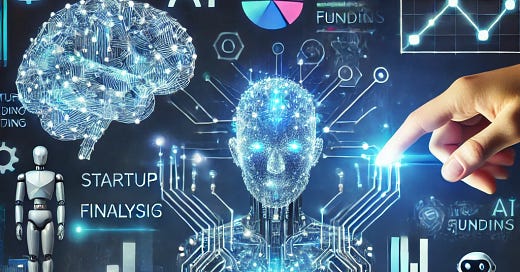Crunchbase AI: Can it Predict Innovation?
The AI revolution is coming for venture capital, and it’s exposing a hard truth: most startup funding decisions aren’t about identifying game-changing innovation—they’re about following the herd.
Crunchbase is pivoting from a data company to an AI company (talk about joining the herd!) and claim they can predict startup success with 95% accuracy. What is startup success? For Crunchbase it is the ability to attract future funding rounds. They claim to do this by analyzing datasets including usage patterns from 80 million active users.
If true, this means venture capitalists—the supposed tastemakers of innovation—are mostly just making obvious bets. The same inputs yield the same outputs. GenAI isn't making VC more innovative; it’s just making it more efficient at doing what it already does: funding slightly different flavors of the same thing.
Real innovation—the kind that changes industries and creates new categories—doesn’t fit neatly into a predictive model.
VC Isn’t About Risk—It’s About Pattern Matching
Ask any VC, and they’ll tell you they’re in the business of taking bets on bold, paradigm-shifting ideas. The reality? Most of them just fund what already looks successful.
Here’s the formula:
Founder worked at a FAANG company? Check.
Elite school on the resume? Check.
A deck that looks just like the last big exit? Double check.
This type of formula / bias is self-fulfilling and shapes future generations of startups. However, history tells us that truly disruptive startups don’t look like other companies.
Amazon in 1994: An online bookstore? When brick-and-mortar was king? Pass.
Tesla in 2008: Mass-market electric cars? With no charging infrastructure? Insane.
Airbnb in 2009: Letting strangers sleep in your house? That’ll never scale.
The Risk of AI-Driven Investing
Let’s be clear—AI won’t make human VC irrelevant. But it will further divide the market:
The top firms will use AI to refine their existing bets. Think Sequoia, a16z, and Benchmark using machine learning to optimize their already-successful playbooks. These firms have the scale, the data, and get shown the best deals. AI will solidify their lead.
Emerging firms will be forced to take real risks. If everyone is funding predictable ideas, the only way to win is to back the unpredictable ones against the AI. This has always been true and is another reason why VCs are incentivized to swing for the fences. Grand slams don’t just make returns, they enable a first-time fund team to raise funds II, III and IV and they let junior players become partners or start their own funds.
Optimization vs. True Transformation
This is a perfect example of AI at the edge rather than AI at the core. Oji will have more to say on this topic in future posts. It’s a classic case of technology optimizing an existing process rather than reinventing it. This kind of AI-driven investing doesn’t change the fundamental mechanics of VC; it just removes friction, speeds up deal flow, and reinforces the dominant patterns.
The problem? Those dominant patterns favor predictability over breakthrough thinking. It’s the equivalent of AI helping hedge funds execute trades faster—it doesn’t make the market fairer or smarter, it just amplifies existing biases and momentum. If anything, this means the real value in VC will shift further away from capital allocation and toward those who can recognize what AI can’t see: the outliers, the misfits, the game-changers.
AI Investing Will Shape Founder Behavior
The real risk here isn’t just what AI-driven investing will prioritize—it’s how founders will respond to it. If VCs increasingly rely on AI to determine funding eligibility, startups will inevitably start shaping their pitches, their hiring decisions, even their entire go-to-market strategies to fit what the algorithm wants to see.
This isn’t a hypothetical; it’s already happening. Look at how pitch decks have become formulaic and how every SaaS startup now boasts "AI-powered" features just to check a box. If AI cements herd mentality in venture capital, we’ll see fewer contrarian bets, less diversity of ideas, and even more founders optimizing for what’s fundable rather than what’s truly valuable.
When the whole industry starts playing by the same rules, the companies that actually change the game will be the ones that ignore the rules entirely. Unfortunately most won’t.
Coming Soon
Upcoming articles will speak about what the role of the PM is and how AI is changing how teams build. For now think about this: when ships were powered by the wind, determining your precise position once a day was enough to ensure you were going in the right direction. In a plane in the mid 20th century, you corrected course several times an hour. In a rocketship, you need to constantly know where you are to steer to where you need to go. So what happens when developer teams deploy features 10x+ faster than they used to, but your positioning and navigation (aka product management) happens only once per sprint?




